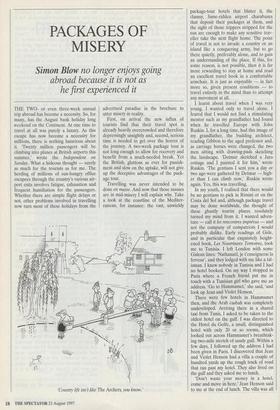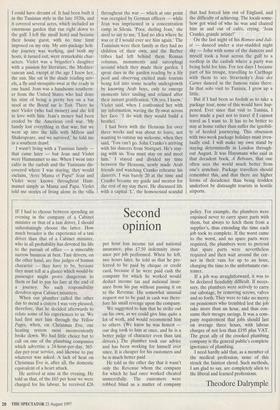PACKAGES OF MISERY
Simon Blow no longer enjoys going
abroad because it is not as he first experienced it
THE TWO- or even three-week annual trip abroad has become a necessity. So, for many, has the August bank holiday long weekend on the Continent. At one time to travel at all was purely a luxury. As this escape has now become a necessity for millions, there is nothing luxurious about it. 'Twenty million passengers will be climbing into planes at British airports this summer,' wrote the Independent on Sunday. What a hideous thought — surely as much for the tourists as for me. The herding of millions of sun-hungry office escapees through the country's various air- port exits involves fatigue, exhaustion and frequent humiliation for the passengers. Whether there are simple flight delays or not, other problems involved in travelling now turn most of these holidays from the advertised paradise in the brochure to utter misery in reality.
First, on arrival the new influx of tourists find that their travel spot is already heavily overcrowded and therefore depressingly unsightly and, second, serious time is needed to get over the horror of the journey. A two-week package tour is not long enough to allow for recovery and benefit from a much-needed break. Yet the British, gluttons as ever for punish- ment and slow on the uptake, will not give up the deceptive advantages of the pack- age tour.
Travelling was never intended to be done en masse. And now that those masses are in mid-misery I will explain why. Take a look at the coastline of the Mediter- ranean, for instance: the vast, unwieldy `Country life isn't like The Archers, you know.' package-tour hotels that blister it, the clumsy, fume-ridden airport charabancs that deposit their packages at them, and the sight of those trippers stripped for the sun are enough to make any sensitive trav- eller take the next flight home. The point of travel is not to invade a country or an island like a conquering army, but to go there quietly, preferably alone, and to gain an understanding of the place. If this, for some reason, is not possible, then it is far more rewarding to stay at home and read an excellent travel book in a comfortable armchair. It is just as enjoyable — in fact more so, given present conditions — to travel entirely in the mind than to attempt any movement at all.
I learnt about travel when I was very young. I wanted only to travel alone. I feared that I would not find a stimulating mentor such as my grandfather had found when he travelled Europe with John Ruskin. I, for a long time, had this image of my grandfather, the budding architect, reading Gibbon to the aged professor and, as carriage horses were changed, the two men sitting with drawing-pads sketching the landscape. `Detmar sketched a Jura cottage and I painted it for him,' wrote Ruskin. 'The gentians I sent you a day or two ago were gathered by Detmar — high- er than I can climb now,' Ruskin wrote again. Yes, this was travelling.
In my youth, I realised that there would be no gentians to pick in Rimini or on the Costa del Sol and, although package travel may be done worldwide, the thought of these ghastly tourist places resolutely turned my mind from it. I wanted adven- ture — call it les rencontres imprevus — and not the company of compatriots I would probably dislike. Early readings of Gide, and in particular that exquisitely height- ened book, Les Noun-itures Tetrestres, took me to Tunisia. I left London with some Gidean lines: Nathanael, je t'enseignerai la ferveur', and they lodged with me like a tal- isman. I knew nobody in Tunisia and I had no hotel booked. On my way I stopped in Paris where a French friend put me in touch with a Tunisian girl who gave me an address. 'Go to Hammamet,' she said, 'and look up Jean and Violet Henson.'
There were few hotels in Hammamet then, and the Arab casbah was completely undeveloped. Arriving there in a shared taxi from Tunis, I asked to be taken to the oldest hotel on the gulf. I was directed to the Hotel du Golfe, a small, distinguished hotel with only 20 or so rooms, which looked out across Hammamet's breathtak- ing two-mile stretch of sandy gulf. Within a few days, I followed up the address I had been given in Paris. I discovered that Jean and Violet Henson had a villa a couple of hundred yards up the rough track of road that ran past my hotel. They also lived on the gulf and they asked me to lunch.
`Don't waste your money in a hotel, come and move in here,' Jean Henson said to me at the end of lunch. The villa was all I could have dreamt of. It had been built it in the Tunisian style in the late 1920s, and it covered several acres, which included an enormous garden that ran right down to the gulf. I left the small hotel and became their house guest, with no time limit imposed on my stay. My anti-package holi- day journey was working, and both my hosts, it turned out, were remarkable char- acters. Violet was a brigadier's daughter with a passion for literature, the Mediter- ranean and, except at the age I knew her, the sun. She sat in the shade reading nov- els, a fly-and-mosquito-swat at the ready in one hand. Jean was a handsome southern- er from the United States who had done his stint of being a pretty boy on a bar stool at the Boeuf sur le Toit. There he met Violet (who had money) and she fell in love with him. Jean's money had been eroded by the American civil war. 'My family lost everything in that war, but we went up into the hills with Milton and Shakespeare, and we survived,' he told me in a southern drawl.
I wasn't living with a Tunisian family that came later — but Jean and Violet were Hammamet to me. When I went into cafés in the casbah and the Tunisians dis- covered where I was staying, they would exclaim, 'Avec Mama et Papa!' Jean and Violet were known throughout Ham- mamet simply as Mama and Papa. Violet told me stories of living alone in the villa throughout the war — which at one point was occupied by German officers — while Jean was imprisoned in a concentration camp in Silesia. 'Poor, darling Jean,' she used to say to me, 'I had no idea where he was or if I would ever see him again.' The Tunisians were their family as they had no children of their own, and the Berber tribes had left behind them Roman columns, monuments and sarcophagi around which they made their garden. I spent days in the garden reading by a lily pool and observing excited male tourists being led into some nearby undergrowth by knowing Arab boys, only to emerge moments later smiling and relaxed after their instant gratification. 'Oh yes, I know,' Violet said, when I confronted her with my information, waving the fly-swat across her face. 'I do wish they would build a brothel.'
I had been with the Hensons for over three weeks and was about to leave, not wanting to outstay my welcome, when they said, 'You can't go. John Cranko's arriving with his dancers from Stuttgart. He's stay- ing with us. You must stay on and meet him.' I stayed and divided my time between the Hensons, newly made Arab friends and watching Cranko rehearse his dancers. I was barely 20 at the time and Cranko became my guide and mentor for the rest of my stay there. He discussed life with a capital '1_,', the homosexual scandal that had forced him out of England, and the difficulty of achieving. The locals some- how got wind of who he was and chaired him in and out of cafés, crying, 'Jean Cranko, grande artiste!'
On the last night of his Romeo and Juli- et — danced under a star-studded night sky — John with some of the dancers and myself took a boat across the gulf to a rooftop in the casbah where a party was being held for him. For ten days I became part of his troupe, travelling to Carthage with them to see Stravinsky's Jeux des Cartes danced in the famous ruins there. In that solo visit to Tunisia, I grew up a little.
But if I had been so foolish as to take a package tour, none of this would have hap- pened. Ever since that visit to Tunisia, I have made a pact not to travel if I cannot travel as I want to. It has to be better to stay at home rather than suffer the ignobili- ty of herded journeying. This obsession with two-week package holidays must even- tually end. I will make my own stand by staying determinedly in London through- out August. It was Huysmans who said in that decadent book, A Rebours, that one often sees the world much better from one's armchair. Package travellers should remember this, and that there are higher forms of decadence than being trodden underfoot by distraught tourists in hostile airports.



























































 Previous page
Previous page